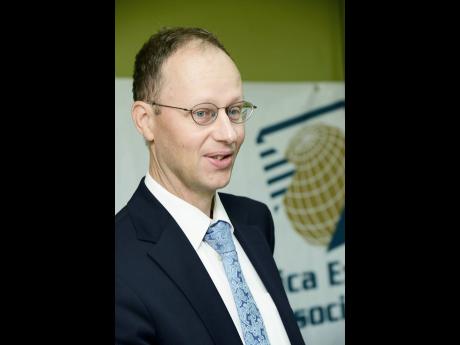Published:Sunday | August 30, 2015
Bert van Selm
Two weeks ago, an IMF team visited Jamaica to conduct discussions on the ninth review of the four-year Extended Fund Facility with the International Monetary Fund.
In meetings with the Jamaican authorities, private sector, academics, and civil society, the team discussed recent economic developments, including the drought, the PetroCaribe debt buyback, and the recent wage agreements with the Jamaica Confederation of Trade Unions (JCTU) and the Jamaica Teachers Association (JTA), and implications of these factors for the economic reform programme.
We conveyed our findings at a concluding press conference jointly held with Finance Minister Peter Phillips. Journalists’ questions focused on whether the fiscal space created by the debt buyback could result in a relaxation of the programme’s fiscal targets, in particular the 7.5 per cent of GDP primary surplus.
As we explained, this has been discussed with the Jamaican authorities and it remains under consideration. Minister Phillips stressed that any additional spending, should it materialise, would have to be squarely focused on growth-enhancing capital investments.
In the view of the team, there is no doubt that the PetroCaribe debt buyback benefits Jamaica. We estimate that the net present value (NPV) gain of the transaction is about US$300 million, or more than two per cent of GDP.
With debt still very high, that is a very welcome debt reduction. The transaction also immediately reduces Jamaica’s debt-to-GDP ratio by about 10 percentage pointsa very important development as that ratio, and its progress over time, is a key indicator of debt sustainability. Jamaica’s EFF-supported programme is anchored on bringing debt-to-GDP to 96 per cent by 2020, and the PetroCaribe debt buyback brings us closer to that goal.
With growth – though increasing – still fragile, and unemployment – though decreasing – still too high, the team welcomes Minister Phillips’ emphasis that any room for additional spending should be used to increase growth-enhancing capital spending.
Jamaica’s infrastructure – roads, water distribution, ports and airports – clearly needs an upgrade, and while the private sector can play and is playing a major role in this, the Government will also need to do its share.
High interest and wage bill
An important reason for Jamaica’s disappointing growth performance over the years is the very high government interest bill and wage bill, which leaves very little room for public expenditure on anything that is not wages or interest.
Jamaica’s infrastructure has suffered badly from thisany pothole-swerving ride on the island will make this immediately clear. By bringing both debt and the size of the public sector under control, Jamaica can make room for critical spending on long-term priorities.
In this context, the team welcomed the recent wage agreement between the Government of Jamaica and the JCTU, as well as with the JTA. The agreement supports the continued fiscal prudence, and should help keep public-sector wages in Jamaica as a share of the economy on a downward trajectory, towards the Government’s goal of nine per cent of GDP for 2016/17.
As indicated by Minister Phillips at the joint press conference, additional measures, such as attrition and voluntary separations, may be necessary to reach that goal.
The agreed increases of four per cent for 2015-16 and three per cent for 2016-17 should also help anchor inflationary expectations. At around four per cent, inflation remains at a historic low in Jamaica, in spite of higher food prices in July on account of the drought. Keeping inflation in the same ballpark as that of key trade partners will help maintain competitiveness while avoiding the need for more exchange rate depreciation.
Public-sector transformation is, of course, about much more than just wages and the wage bill. The ultimate goal is to create an efficient public sector that is geared towards facilitating private sector growth. With that in mind, the team urged the Government to move ahead more forcefully with comprehensive public sector reform.
The team’s overall assessment was that a gradual economic recovery is, slowly but surely, taking hold and that the Government’s implementation of Jamaica’s reform programme remains strong.
The ninth review is expected to be considered by the Executive Board of the IMF next month. Expect to see the team back in Kingston in November for discussions on the 10th review.




Leave A Comment